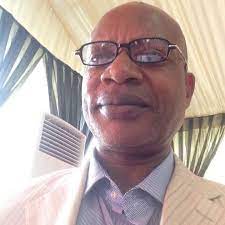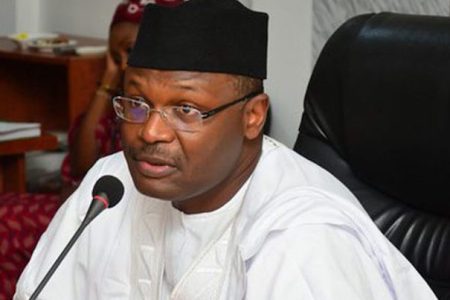
By Ehichioya Ezomon
Let’s be clear with these parameters from the get go: Apart from the Independent National Electoral Commission (INEC), no individual or group has the power, and the authority to manage federal and state elections in Nigeria; and no election observation entity can pronounce on the electoral process conducted by the INEC.
On its website, www.inecnigeria.org, the INEC states that it’s “established by the 1999 Constitution of the Federal Republic of Nigeria to, among other things, organize elections into various political offices in the country.” And that, the functions of INEC “are contained in Section 15, Part 1 of the Third Schedule of the 1999 Constitution (As Amended) and Section 2 of the Electoral Act 2010 (As Amended).”
The above section 15 states unambiguously that, “The Commission shall have power to –
(a) organise, undertake and supervise all elections to the offices of the President and Vice President, the Governor and Deputy Governor of a State, and the membership of the Senate, the House of Representatives and the House of Assembly of each State of the Federation; (h) delegate any of its powers to any Resident Electoral Commissioner; and (i) carry out such other functions as may be conferred upon it by an Act of the National Assembly.”
In accordance with section 15(i), the INEC produces Regulations and Guidelines to aid its operations, with a platform for Election Observation. In readiness for the 2023 General Election – and post-review of the Regulations and Guidelines based on the amendment of the Electoral Act 2022 – the INEC Chairman, Prof. Mahmood Yakubu, had a session with Observation Missions to the election, to intimate them about the new guidelines.
According to Yakubu, these guidelines “are provided to ensure election observation duties are carried out in accordance with the law and in line with international best practices,” adding that for the commission, “the observation of elections by national, regional, continental and international organisations form an important part of the electoral process. We are convinced that having a robust Election Observation platform will enhance the perception of our Elections as not only transparent, but credible.”

It appears over time that some observation missions have taken undue liberty of the platform provided by the INEC – in order to “enhance the perception of elections as not only transparent, but credible” – to overstep their bounds. Which’s why in the lead-up to the September 21, 2024, governorship election in Edo State (and Ondo State in November 2024), the INEC warned the election observers to keep to the rules of engagement or risk their accreditations.
At a training session for election observers in Abuja on July 18, the National Commissioner and Chairman of the Election and Party Monitoring Committee, Sam Olumekun, said for the groups to retain their accreditations, they must adhere to the rules.
“As accredited Observer Groups, you will be allowed access to observe all the election processes as outlined in the commission’s Reviewed Regulations and Guidelines for the conduct of elections available at the INEC website,” Mr Olumekun said.
“While there are quite a number of trustworthy, honest, objective, hardworking and credible observer groups in the country, who have contributed greatly to deepening democracy and the electoral process in Nigeria over the years, there are still others who have continued to display laxity about election observation and have cared less about the integrity of the entire process.
“I need to, however, bring to your attention that your accreditation may be withdrawn at any stage of the election process if it is established that your organisation is violating the Code of Conduct for observers as contained in the Guidelines for Election Observation available on INEC website.”
The classification of the accredited observation groups for the Edo governorship election shows that 28 were gender-based, three represented persons with disability, eight were faith-based, 10 international and over 100 others worked in areas relevant to the functions of the INEC.
Notwithstanding the INEC cautionary advice, many of the Observers were engaged in unauthorised actions during the Edo poll, with some pronouncing on the results even when the process was ongoing. Their talking heads were all over television stations, and on social media, analysing and posting on the outcome, while the process was yet to be completed by the INEC.
The Observers barely contained themselves from declaring the full results, and announcing the winner before the INEC did so on Sunday, September 22. And they came out swinging thereafter, rejecting the declaration, and calling for a review – a euphemism for reversing the INEC official pronouncement in favour of another “winner” of the election.
The INEC had declared Senator Monday Okpebholo of the APC as the winner of the election, polling 291,667 votes to defeat PDP’s Asue Ighodalo, who scored 247,274 votes, and the Labour Party (LP’s) Olumide Akpata, who garnered 22,763 votes, to place second and third, respectively.
However, Yiaga Africa, one of the election monitoring outfits (along with a group of Civil Society Organisations (CSOs) and Governors elected on the PDP platform) rejected offhand the declaration, on the grounds of alleged manipulation of the collation by INEC’s officials via alteration of the results to favour the APC and Okpebholo.
In the summary of the report on the poll posted on its website, Yiaga Africa states: “Yiaga Africa has comprehensively assessed the September 2024 Edo State Governorship Election using its Process and Results Verification for Transparency (PRVT) methodology. Our 325 observers monitored polling units across all 18 LGAs, identifying critical issues that compromised the integrity of the election.
“While some processes, such as voting and counting, showed substantial compliance, serious irregularities in the results collation process have raised significant concerns. Yiaga Africa calls for urgent electoral reforms and thorough investigations into the manipulations observed. This assessment underscores the need for a renewed commitment to transparency and accountability in Nigeria’s electoral system.”
And in a statement on September 24 about its report, Yiaga Africa said the INEC’s results, which returned Okpebholo, failed the integrity test, as they didn’t fall within Yiaga Africa’s “estimated ranges” due to alleged manipulation of results during the collation by electoral officials.
In the post-election statement signed by its Chair for Edo 2024, Dr Aisha Abdullahi, and Executive Director, Mr Samson Itodo, Yiaga Africa boasts “it can project the expected vote shares for each party within a narrow margin,” noting that, according to INEC, the APC received 51.1% of the votes, PDP, 43.3% of the votes, and the Labour Party garnered 4.0% of the votes.
“Based on reports from 287 of 300 (96%) sampled polling units, Yiaga Africa’s statistical analysis shows inconsistencies in the official results announced by INEC,” the group says. “For instance, the official results announced by INEC for APC in Oredo and Egor LGAs fall outside the PRVT estimate. In Esan West LGA, the official results for PDP fall outside the PRVT estimates. Also, in Oredo LGA, the official results as announced for LP fall outside the PRVT estimates.
“These inconsistencies with Yiaga Africa’s PRVT estimates indicate that the results were altered at the level of collation. The disparities between the official results released by INEC and Yiaga Africa’s PRVT estimates indicate manipulation of results during the collation process.
“Yiaga Africa strongly condemns the actions of some biased INEC officials who altered figures during collation, including the actions of some security officials, who interfered with the collation process. Yiaga Africa notes that the cases of disruption in Ikpoba/Okha, Etsako West, Egor, and Oredo LGAs in the course of collation created opportunities for election manipulation, raising significant concerns about the credibility and integrity of the results collation process.
“Yiaga Africa calls for the immediate investigation and prosecution of polling officials and collation officers who are engaged in results manipulation and flagrant violations of the guidelines on results collation.”
The question: Is Yiaga Africa correct in its declaration that the results of the Edo governorship election were manipulated by INEC’s officials, to warrant a wholesale rejection of the electoral umpire’s decision on September 22? Is Yiaga Africa a parallel agency responsible for managing elections in Nigeria? Certainly, and absolutely not!
Even as it inadvertently admits its lack of authority to pronounce on results of elections, stating, “it can only verify the election outcome if it falls within its estimated margins,” Yiaga Africa, with an air of infallibility, adds that, “if the official results do not fall within Yiaga Africa’s estimated ranges, then the results may have been manipulated.”
So, election results in Nigeria should be based on estimations, rather than actual facts and figures from the voting? What a self-appointed arrogant, almighy and all-knowing ombudsman Yiaga Africa is! Until Yiaga Africa gives an all-clear, no election it monitors is transparent and credible to be declared by the officially-recognised electoral agency?
In the case of the Edo poll, how can Yiaga Africa – dealing with estimates, and with only about 300 field officials – conclusively declare its monitoring overrides the INEC’s that deals with raw and cold votes from over 4,000 polling units in the election? That’s unbelievable, and an overstretch!
It’s no surprise that the APC – basking in its electoral victory of September 21 in Edo State – goes at Yiaga Africa’s jugular, blasting the group for “overreaching its election observer mission,” and constituting itself into a “parallel agency” for declaring election results.
In a statement on September 24 in Abuja, the National Publicity Secretary of the APC, Mr Felix Morka, noted Yiaga Africa’s reported “widespread manipulation of results” and discrepancies between its estimates and INEC’s official figures.
Faulting the group, Morka said: “Alleging that results were manipulated without hard facts and figures, but based on some statistical guesswork is a clear disservice to the electoral process. Yiaga Africa’s report is a travesty, replete with methodological flaws, politicized observations, inconsistencies, inaccuracies, and called its credibility into question.
“Election observer missions are not election management agencies and cannot usurp INEC’s statutory authority as the sole election management body in Nigeria. Doing so would constitute a clear breach of the Electoral Act and the Constitution of the Federal Republic of Nigeria.”
Morka said that while election observer missions, like Yiaga Africa, are at liberty to share their observations about the election process with INEC and the general public, “declaring election result or second-guessing result declared by INEC in performance of its statutory duties, falls beyond their observation mandate.”
“Declaring or second-guessing the Edo State gubernatorial result based on unsubstantiated, unverified, highly questionable statistical parameters created by Yiaga Africa for Yiaga Africa is designed to create unnecessary confusion and the appearance of a parallel election process,” Morka said.
He urged Yiaga Africa to “refrain from enlisting itself in the season’s annals of infamy, alongside the likes of Governor Godwin Obaseki and his illegal and sinister midnight invasion of INEC’s offices, and (Adamawa State) Governor Ahmadu Fintiri’s illegal declaration of bogus election result.”
Because of Nigeria’s desire, and the INEC determination to give a platform to Observation Missions – “to enhance the perception of our Elections as not only transparent, but credible” – the likes of Yiaga Africa may be emboldened to fully supplant the powers and functions of the Commission, and announce the results of elections, and declare the winners and losers before the INEC concludes the process.
It’s no longer when and how, but how soon – and it’ll be very soon – if care isn’t taken! It’s time to save the situation and rein in some election Observation Missions itching and eager to dictate to and determine for the INEC the pace, the process and the outcomes of elections in Nigeria!
• Mr Ezomon, Journalist and Media Consultant, writes from Lagos, Nigeria.
.




GIPHY App Key not set. Please check settings